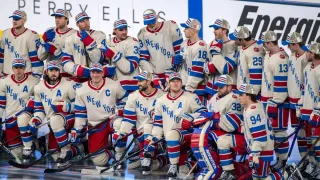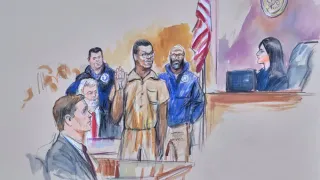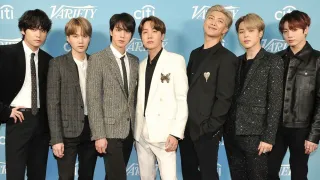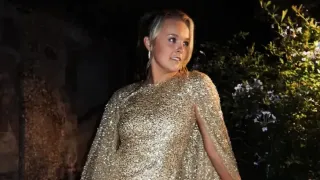September 11, 2023
EDGE Interview: Director Jacqueline Castel and Screenwriter Jae Matthews on Their Lesbian Werewolf Movie
Kilian Melloy READ TIME: 7 MIN.
First-time feature film director Jacqueline Castel and first-time feature screenwriter (and member of the band Boy Harsher) Jae Matthews investigate lycanthropy from a lesbian perspective with "My Animal," a film about an alienated young woman named Heather who, the press notes tell us, is "tormented by a hidden family curse" and "forced to live a secluded life on the outskirts of a small town".
Not merely a small town, mind you, but a town full of bored, sometimes violent men who look down on women. Heather, played by nonbinary actor Bobbi Salvör Menuez of "Euphoria," isn't just marginalized geographically, though. She also falls in between identities and social roles. She's no longer in high school, but she's not yet an adult; she can't partake in what little social scene there is because of fears that her werewolf nature will reveal itself; and, as the film progresses, it becomes obvious that she's not someone who's going to be dating boys – and not just because the local guys are such jerks. Falling in love with Johnny (Amandla Stenberg, "Bodies, Bodies, Bodies") offers sunlight in the midst of darkness (of which the film offers plenty, being set in wintertime in Canada) and happiness in the midst of stress and dissatisfaction. But how long will it...or can it...last? And what will the consequences be?
EDGE chatted with Jacqueline Castel and Jae Matthews to find out more about what was on their minds when they dreamed up the story of a young woman whose heart belongs to another woman, and whose soul contains the spirit of a wolf.
EDGE: Lesbian werewolf movies are a rarity, though it seems like it would be a thematically obvious thing.
Jacqueline Castel: One of the things that attracted me to the project was that there was something kind of new that was being brought to the genre that I hadn't seen before – specifically, the execution of the screenplay, a way in which things were revealed and all the nuances and subtleties to the script and the genre-bending aspect of it. You have [a] coming of age [story] and you have this romantic story, as well. I was drawn to the project exactly for the reason that it was approaching something that I think people have a pretty knee jerk reaction to in terms of what their expectations are.
EDGE: Jae, were the associations of lunar cycles with femininity and feminine power something you wanted to play with and investigate?
Jae Matthews: Truthfully, no. I have to credit Jacqueline for really coming in and thematically making the moon and lunar [associations] a part of the story. Initially, I was more interested in exploring a character that could transform into something violent and become an entity that can really explore some of the rage they were experiencing.
EDGE: Horror movies have always been about the outsider, and LGBTQ+ people relate to the genre in a particular way because of that. Were you thinking there's a niche that needs to be filled with a lesbian werewolf?
Jae Matthews: No, [that was] not my intention. I was trying to capture some of the experiences that I myself have gone through... I truly have to write from a place of experience. Maybe the most obvious point is when someone is disenfranchised or feeling powerless. they fantasize about becoming something that is powerful. Previously, in terms of the werewolf genre, you've only really kind of seen it as a masculine transformation. "Gingersnaps" is a very cool outlier, but generally [a werewolf movie] is about an able-bodied man becoming an incredibly strong beast. Maybe some of the fantasy within "My Animal" relies on that; like, "Well, I want to have power, and I want to be able to represent some of the turmoil I'm experiencing."
Jacqueline Castel: When I'm coming at reading any kind of material, I have to be connected to it personally. I'm interested in stories about outsider figures, and I think that's just coming from my own position of feeling that way when I was growing up – feeling like I really did not fit in with my environs, either my family dynamic or society at large. I was very isolated when I was growing up in a lot of small, strange towns. I lived down the street from the Westboro Baptist Church in Topeka, Kansas, so I saw them every day. I think that sharpened me into the person that I then became, because I knew that there was something so outrageously wrong about that, on an ethical and moral level. Thinking about that idea in the context of a transformation tale was really interesting.
EDGE: You both mention a personal connection with the material, so is it the coming-of-age aspect that draws you – the realization that one isn't going to fit into society's binary/heterosexual/cisgender default?
Jacqueline Castel: The coming-of-age element is gonna naturally stir up that time in your life when you're struggling with who it is that you are, or want to become. I was this punk kid with a shaved head, you know? I was struggling through this whole time period of my life. I felt like I could really connect with that character and where they're coming from.
EDGE: Nonbinary actor Bobbi Salvör Menuez plays the film's main character, Heather. What was involved with their casting?
Jacqueline Castel: Jae and I were batting around ideas of potentials [for the role] and Bobbi's name got brought up. I was already aware of Bobbi from the New York independent filmmaking scene, and we had a lot of mutual friends. I had already seen some of Bobbi's work, but I hadn't really seen anything where Bobbi could anchor a whole movie and take on a lead role. I thought that Bobbi deserved that, and I wanted to see them be able to take the stage in that way.
EDGE: Heather's red hair is so striking, it's one of the film's primary visual elements all by itself – especially since red plays such a key role in the look of the movie. Was that something you wanted from the first, or something you wanted to bring into the story because it was such a good match to the movie's overall vibe?
Jae Matthews: I believe, and maybe Jacquie will correct me, the way it's written in the script is that Heather is "horse haired." I was the type of person in high school who didn't understand at all how to mold myself into what I saw as attractive, and the perception that my hair was like horsehair – essentially, thick and frizzy and gross, and unable to be changed. Generally, Heather's appearance is supposed to be unsubscribed to any type of beauty standard because they not only don't get it, but they aren't afforded natural beauty, the way that I felt like I wasn't. Obviously, when you're writing yourself into a character, you're giving that character all of your insecurities.
When we were talking about casting, it was very important to me that the person cast couldn't be a natural beauty. It had to be someone who was a little more masculine and unable to carry themselves in this incredibly feminine way. I will say that Bobbi, my experience of Bobbi, they are a very beautiful person and physically illustrious. It really speaks to their acting ability that they were able to live into the masculinity and the rawness of Heather.
Jacqueline Castel: "Horse hair" was definitely the way it was described, which I always really loved.
[Laughter]
Jacqueline Castel: You have to listen to what evolves in a project, right? It becomes its own living and breathing entity. I have one really funny story in regards to Bobbi, specifically with casting: Six or eight months before I started the casting process, I went up to the Wolf Conservation Center in upstate New York just to kind of hang out with wolves and talk to some of the people who work there. You can symbolically adopt a wolf, and so I adopted this wolf named Diane because that's the goddess of the hunt and the goddess of the moon, and, I later learned, the goddess of, like, tomboys. I'm. like, "This is so bizarrely perfect." Months later, I'm starting the casting process, I'm starting to have conversations with Bobbi, and I get this email from the Wolf Conservation Center, and they're like, "It's your wolf's birthday" – and the wolf was born the same day as Bobbi. I was like, "Okay, that's it. That was supposed to happen. I'm not going to like fight this."
That was really special, and that reaffirmed some of the intuition you have to go off of. I try to always trust my gut on this kind of stuff.
"My Animal" is in theaters now.
Watch the trailer:






